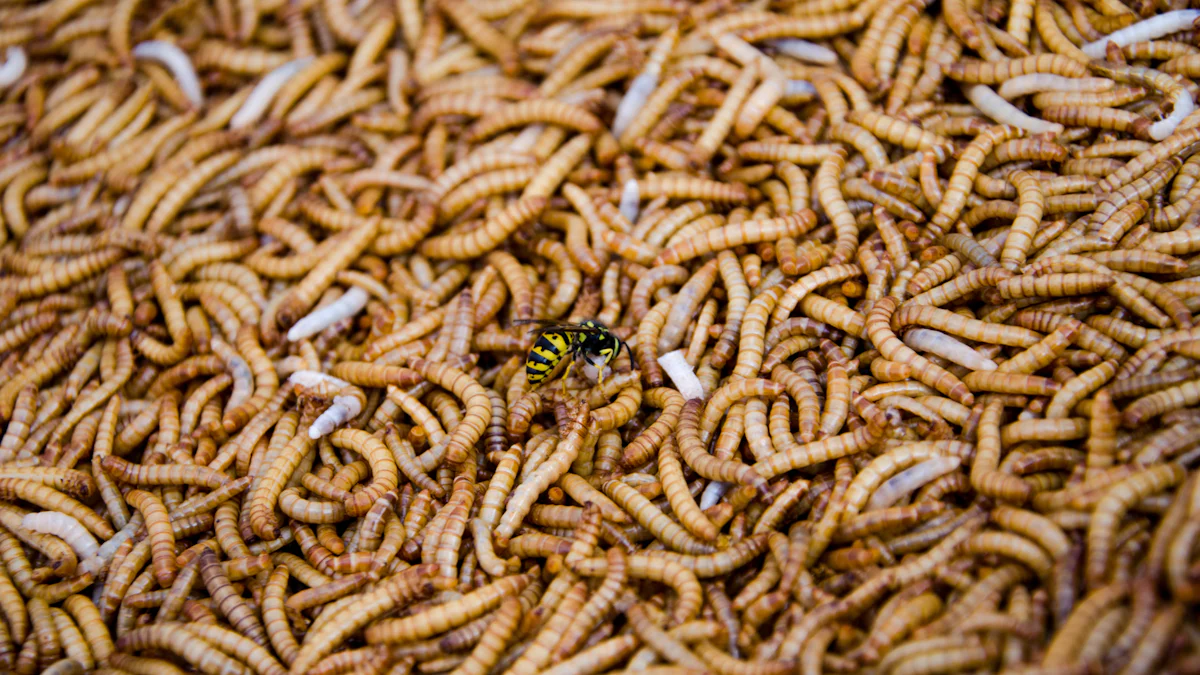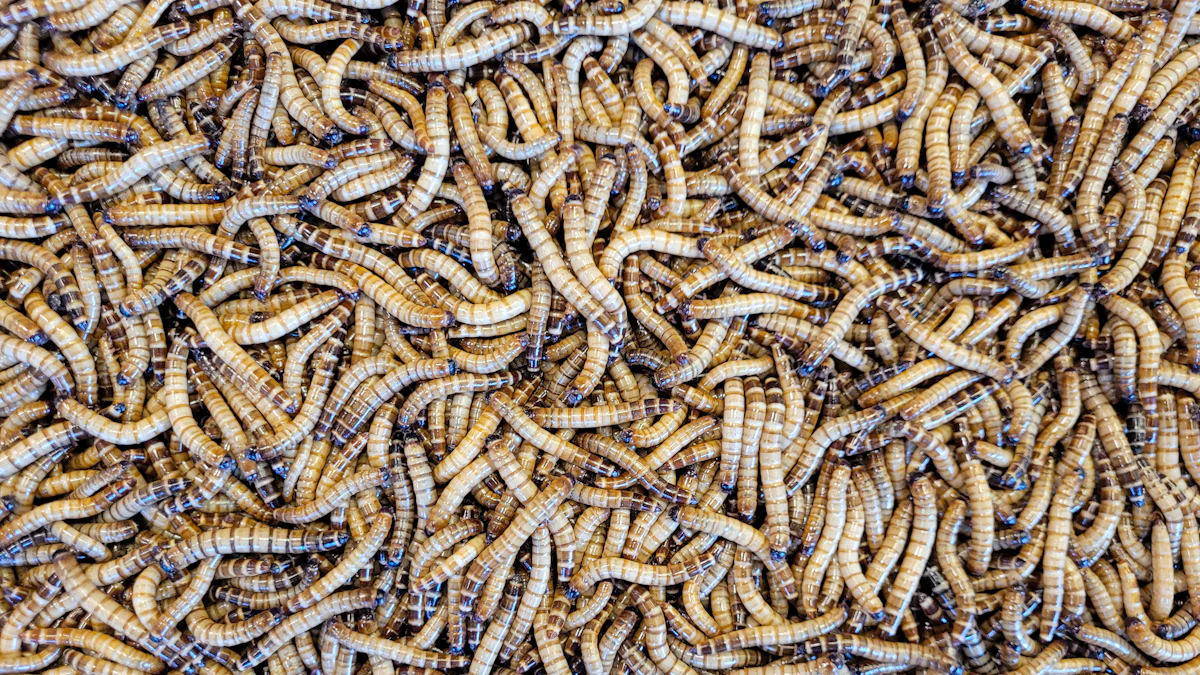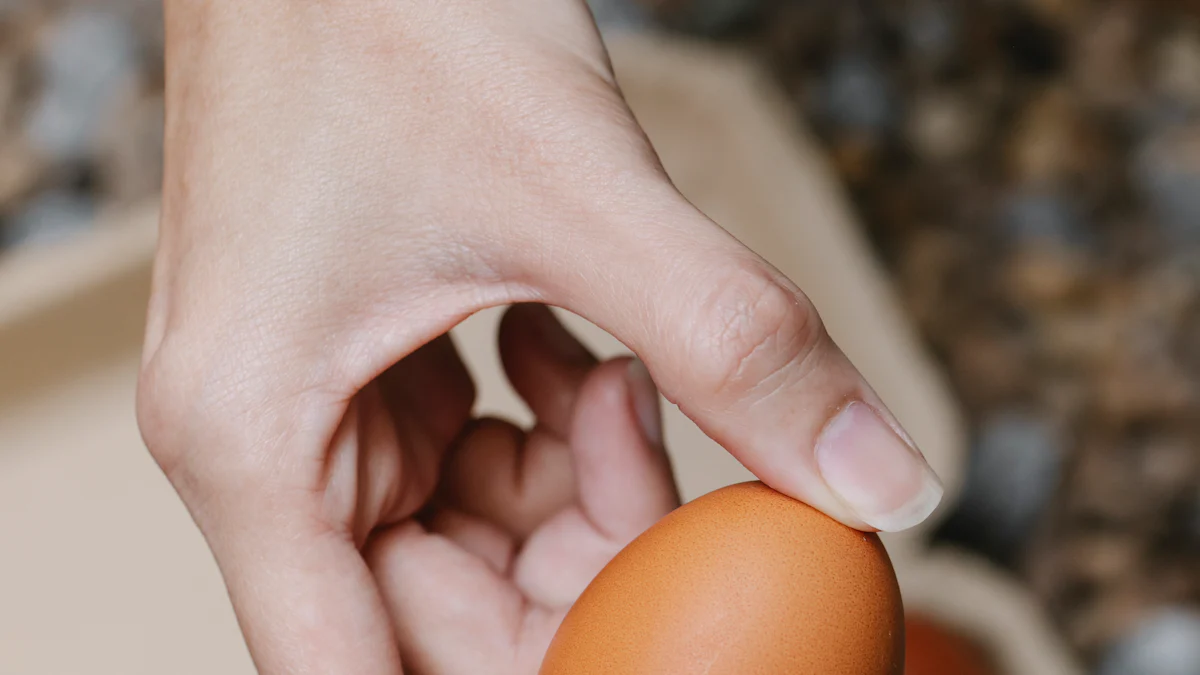
Mealworms can transform how you feed your hens. Packed with protein, they help hens lay eggs more consistently. Studies show that mealworms improve egg quality, making shells thicker and yolks richer in color. Plus, their fatty acids and vitamins boost hen health. Adding mealworms to chicken feed ensures better egg production and happier hens. 🐔🥚
Key Takeaways
- Mealworms are full of protein and help hens lay better eggs. They make eggs bigger, with stronger shells and brighter yolks.
- Add mealworms to your hens’ food, about 10-15% of their diet. This gives them the right nutrients without too much protein.
- Growing mealworms at home is easy and cheap. Keep them in the right temperature and humidity for a steady supply.
Why Mealworms Are Essential for Chicken Feed

High Protein for Egg Formation
Protein is the building block for eggs, and mealworms are packed with it. With about 50% protein content, mealworms outshine many other common chicken feed ingredients like grains. For example:
- Corn has significantly lower protein levels.
- Wheat offers more protein than corn but still falls short of mealworms.
When you add mealworms to your chicken feed, you’re giving your hens the fuel they need to produce eggs consistently. The protein in mealworms also helps improve egg size and nutritional value. Studies show that hens fed mealworms lay eggs with thicker shells and richer yolks. This means healthier hens and better-quality eggs for you.
| Benefit | Description |
|---|---|
| Improved Egg Production | Mealworms contribute to better egg production and overall health of hens. |
| Consistency in Egg Laying | Hens that consume mealworms lay eggs more consistently. |
| Nutritional Quality of Eggs | Eggs produced have improved shell thickness and yolk color. |
Essential Fats and Nutrients for Healthy Hens
Mealworms aren’t just about protein. They’re also rich in essential fats like omega-3 and omega-6, which are vital for your hens’ metabolism. These fats boost their immune system, making them less prone to diseases. Plus, mealworms provide key vitamins and minerals like Vitamin B12, calcium, and phosphorus. These nutrients play a big role in energy metabolism and eggshell formation. Healthier hens mean better egg production and fewer issues during molting or stressful periods.
Benefits for Egg Quality and Consistency
Adding mealworms to your chicken feed can lead to noticeable improvements in egg quality. The shells become thicker, reducing the chances of breakage. The yolks turn a deeper, more vibrant color, which is a sign of better nutrition. Mealworms also help hens lay eggs more consistently, even during challenging times like winter or molting. With mealworms, you’re not just feeding your chickens—you’re investing in better eggs and healthier hens.
How to Raise or Source Mealworms
Setting Up a Mealworm Farm
Starting your own mealworm farm is easier than you might think. You’ll need a container at least 6 inches deep, like a plastic bin or aquarium with smooth sides. Add 3 inches of organic substrate, such as wheat bran or oatmeal, for the mealworms to live in. Drill small holes or use a mesh screen on the lid for ventilation. Toss in some mealworms or Darkling Beetles to get started. For moisture, add a couple of potato slices or carrots. Keep the container in a dark spot where the temperature stays between 75-85°F. This setup creates the perfect environment for mealworms to thrive.
Feeding and Breeding Mealworms
Mealworms need proper care to grow and reproduce. Keep the humidity between 50%-70% to prevent eggs from drying out. You can use a moist sponge or a bowl of water nearby to maintain this balance. Feed them cabbage, bread, or apple slices, but avoid overwatering their food to prevent mold. Ventilation is key—too much carbon dioxide can harm them. With the right conditions, beetles will lay more eggs, ensuring a steady supply of mealworms for your chicken feed.
| Aspect | Recommendation |
|---|---|
| Humidity | Maintain 50%-70% to prevent egg drying. |
| Temperature | Keep between 77-88°F for optimal growth. |
| Ventilation | Ensure airflow to avoid CO2 buildup. |
Buying Mealworms as an Alternative
If farming mealworms feels like too much work, buying them is a great option. Many suppliers sell mealworms in bulk, either live or dried. While raising them can be cost-effective, purchasing mealworms saves time and effort. Look for reputable sellers who provide high-quality mealworms to ensure your hens get the best nutrition. Adding mealworms to your chicken feed will help improve egg production and quality.
Incorporating Mealworms Into Chicken Feed

Recommended Quantities and Feeding Schedule
When adding mealworms to your chicken feed, the right amount makes all the difference. For laying hens, mealworms should make up about 10-15% of their total feed. This balance ensures they get enough protein and nutrients without overloading their diet. Non-laying hens can thrive with a slightly lower percentage, around 10%.
Start by offering about 10-15 live mealworms per chicken once or twice a week. Sprinkle them on their regular feed or serve them separately. Chickens love to forage, so turning it into a fun hunt can keep them active and happy. Remember, mealworms are a treat, not a replacement for their main feed. Keep their diet diverse with grains, fruits, and vegetables to ensure they stay healthy.
Balancing Mealworms with Other Feed Components
Mealworms are a fantastic addition to chicken feed, but balance is key. They’re rich in protein and fats, which are essential for egg production and hen health. However, chickens also need carbohydrates, vitamins, and minerals from other sources. Grains like corn and wheat provide energy, while fruits and veggies add fiber and additional nutrients.
To create a balanced diet, mealworms should complement—not dominate—the feed. For laying hens, slightly increasing the percentage of mealworms can boost egg quality and consistency. Gradually introduce mealworms into their diet to avoid overwhelming their digestive system. This approach ensures your chickens get the best of both worlds: a complete diet and the benefits of mealworms.
Avoiding Overfeeding and Potential Risks
While mealworms are nutritious, overfeeding can cause problems. Too many mealworms can lead to weight gain and even obesity in chickens. Excess protein might trigger behavioral issues like aggression or stress within the flock. Digestive complications, such as intestinal blockages, can also occur if mealworms dominate their diet.
To avoid these risks, treat mealworms as a supplement, not the main course. Limit them to about 10% of the daily diet and monitor your chickens for any changes in behavior or health. Overfeeding can also attract pests like rodents and flies, so clean up any leftovers promptly. By keeping mealworms as part of a balanced diet, you’ll ensure your chickens stay healthy and productive.
Mealworms can transform your approach to chicken feed. They’re packed with protein, fatty acids, and essential nutrients that improve egg production and hen health. Hens fed mealworms lay larger, more nutritious eggs with thicker shells and vibrant yolks. By raising or sourcing mealworms, you can boost egg yield while keeping costs low. Their rapid growth and efficient protein conversion make them a sustainable choice. With proper feeding practices, mealworms offer a cost-effective way to ensure healthier hens and better eggs in 2025.
FAQ
How do mealworms improve egg production?
Mealworms provide protein and nutrients that keep hens healthy. Healthy hens lay eggs more consistently, with thicker shells and vibrant yolks.
Can I feed mealworms to chickens every day?
You can, but limit them to 10-15% of their diet. Overfeeding can cause health issues like obesity or digestive problems.
Are dried mealworms as good as live ones?
Yes! Dried mealworms offer the same nutrients as live ones. They’re easier to store and less messy, making them a convenient option.


